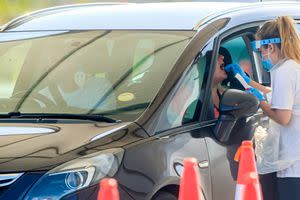Coronavirus: 2,988 new COVID-19 cases reported in UK in 24 hours
It is a large rise on yesterday's figure of 1,813 infections.
Today's number is the highest daily total since 23 May, when there were 2,959 cases.
Scotland's first minister, Nicola Sturgeon, said the update "reminds us again of the need to be very vigilant".
Labour's shadow health secretary, Jonathan Ashworth, tweeted: "Deeply concerning increase in cases and a stark reminder there is no room for complacency in suppressing Covid."
He added that Health Secretary Matt Hancock "must come to (the) Commons tomorrow" to explain the latest government position on testing.
Overall, 347,152 cases have now been confirmed.
Two more coronavirus-related deaths have also been reported in the UK. It takes the total to 41,551.
Separate figures from statistics agencies show there have now been 57,300 deaths registered in the UK where COVID-19 was mentioned on the death certificate.
Residents of Bolton have been told not to mix with people from other households after the town's coronavirus infection rate became the highest in England.
The rules apply to meetings indoors and outdoors, unless a person is part of a support bubble, Bolton Council said.
Bolton is the worst-affected area in the country, with a weekly infection rate of 99 cases per 100,000 people, overtaking Pendle (71.1), Oldham (55.6) and Blackburn with Darwen (48.3).
Comparisons between recent and past cases should be made with caution.
The number of confirmed cases is heavily dependent on how many people - and who - is tested.
This has changed significantly since the start of the pandemic, with the number of tests processed each day increasing significantly.
Community testing has also expanded, whereas previously, access was limited to symptomatic patients and key-workers.
The R number is a measure of how many people on average each infected person transmits the virus to. The latest government data shows how the number varies across different parts of the UK.
While England has an estimated R number of between 0.9 and 1.0, Wales has an estimated number of 0.5 and 0.9. Scotland's R number is estimated to be between 0.9 and 1.4. The number could be as high as 1.6 in Northern Ireland.

 Yahoo News
Yahoo News 




